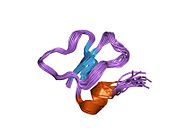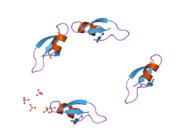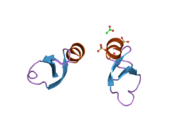Beta defensin 1
Appearance
Beta-defensin 1 is a protein that in humans is encoded by the DEFB1 gene.[5][6]
Defensins form a family of microbicidal and cytotoxic peptides made by neutrophils. Members of the defensin family are highly similar in protein sequence. This gene encodes defensin, beta 1, an antimicrobial peptide implicated in the resistance of epithelial surfaces to microbial colonization. This gene maps in close proximity to defensin family member defensin, alpha 1, and has been implicated in the pathogenesis of cystic fibrosis.[6]
References
- ^ a b c ENSG00000284881 GRCh38: Ensembl release 89: ENSG00000164825, ENSG00000284881 – Ensembl, May 2017
- ^ a b c GRCm38: Ensembl release 89: ENSMUSG00000044748 – Ensembl, May 2017
- ^ "Human PubMed Reference:". National Center for Biotechnology Information, U.S. National Library of Medicine.
- ^ "Mouse PubMed Reference:". National Center for Biotechnology Information, U.S. National Library of Medicine.
- ^ Bensch KW, Raida M, Magert HJ, Schulz-Knappe P, Forssmann WG (Sep 1995). "hBD-1: a novel beta-defensin from human plasma". FEBS Lett. 368 (2): 331–5. doi:10.1016/0014-5793(95)00687-5. PMID 7628632.
- ^ a b "Entrez Gene: DEFB1 defensin, beta 1".
Further reading
- Ganz T, Lehrer RI (1995). "Defensins". Pharmacol. Ther. 66 (2): 191–205. doi:10.1016/0163-7258(94)00076-F. PMID 7667395.
- Bonaldo MF, Lennon G, Soares MB (1997). "Normalization and subtraction: two approaches to facilitate gene discovery". Genome Res. 6 (9): 791–806. doi:10.1101/gr.6.9.791. PMID 8889548.
- Goldman MJ, Anderson GM, Stolzenberg ED, et al. (1997). "Human beta-defensin-1 is a salt-sensitive antibiotic in lung that is inactivated in cystic fibrosis". Cell. 88 (4): 553–60. doi:10.1016/S0092-8674(00)81895-4. PMID 9038346.
- McCray PB, Bentley L (1997). "Human airway epithelia express a beta-defensin". Am. J. Respir. Cell Mol. Biol. 16 (3): 343–9. doi:10.1165/ajrcmb.16.3.9070620. PMID 9070620.
- Liu L, Zhao C, Heng HH, Ganz T (1997). "The human beta-defensin-1 and alpha-defensins are encoded by adjacent genes: two peptide families with differing disulfide topology share a common ancestry". Genomics. 43 (3): 316–20. doi:10.1006/geno.1997.4801. PMID 9268634.
- Valore EV, Park CH, Quayle AJ, et al. (1998). "Human beta-defensin-1: an antimicrobial peptide of urogenital tissues". J. Clin. Invest. 101 (8): 1633–42. doi:10.1172/JCI1861. PMC 508744. PMID 9541493.
- Schnapp D, Reid CJ, Harris A (1999). "Localization of expression of human beta defensin-1 in the pancreas and kidney". J. Pathol. 186 (1): 99–103. doi:10.1002/(SICI)1096-9896(199809)186:1<99::AID-PATH133>3.0.CO;2-#. PMID 9875146.
- Hiratsuka T, Nakazato M, Ashitani J, Matsukura S (1999). "[A study of human beta-defensin-1 and human beta-defensin-2 in airway mucosal defense]". Kansenshogaku Zasshi. 73 (2): 156–62. doi:10.11150/kansenshogakuzasshi1970.73.156. PMID 10213993.
- Gropp R, Frye M, Wagner TO, Bargon J (1999). "Epithelial defensins impair adenoviral infection: implication for adenovirus-mediated gene therapy". Hum. Gene Ther. 10 (6): 957–64. doi:10.1089/10430349950018355. PMID 10223729.
- Mathews M, Jia HP, Guthmiller JM, et al. (1999). "Production of beta-defensin antimicrobial peptides by the oral mucosa and salivary glands". Infect. Immun. 67 (6): 2740–5. PMC 96577. PMID 10338476.
- Bøe R, Silvola J, Yang J, et al. (1999). "Human beta-defensin-1 mRNA is transcribed in tympanic membrane and adjacent auditory canal epithelium". Infect. Immun. 67 (9): 4843–6. PMC 96817. PMID 10456939.
- Yang D, Chertov O, Bykovskaia SN, et al. (1999). "Beta-defensins: linking innate and adaptive immunity through dendritic and T cell CCR6". Science. 286 (5439): 525–8. doi:10.1126/science.286.5439.525. PMID 10521347.
- Tunzi CR, Harper PA, Bar-Oz B, et al. (2000). "Beta-defensin expression in human mammary gland epithelia". Pediatr. Res. 48 (1): 30–5. doi:10.1203/00006450-200007000-00008. PMID 10879797.
- Sahasrabudhe KS, Kimball JR, Morton TH, et al. (2000). "Expression of the antimicrobial peptide, human beta-defensin 1, in duct cells of minor salivary glands and detection in saliva". J. Dent. Res. 79 (9): 1669–74. doi:10.1177/00220345000790090601. PMID 11023262.
- Jia HP, Starner T, Ackermann M, et al. (2001). "Abundant human beta-defensin-1 expression in milk and mammary gland epithelium". J. Pediatr. 138 (1): 109–12. doi:10.1067/mpd.2001.109375. PMID 11148522.
- Ali RS, Falconer A, Ikram M, et al. (2001). "Expression of the peptide antibiotics human beta defensin-1 and human beta defensin-2 in normal human skin". J. Invest. Dermatol. 117 (1): 106–11. doi:10.1046/j.0022-202x.2001.01401.x. PMID 11442756.
- Carothers DG, Graham SM, Jia HP, et al. (2001). "Production of beta-defensin antimicrobial peptides by maxillary sinus mucosa". American Journal of Rhinology. 15 (3): 175–9. doi:10.2500/105065801779954238. PMID 11453504.
- Hoover DM, Chertov O, Lubkowski J (2001). "The structure of human beta-defensin-1: new insights into structural properties of beta-defensins". J. Biol. Chem. 276 (42): 39021–6. doi:10.1074/jbc.M103830200. PMID 11486002.




















